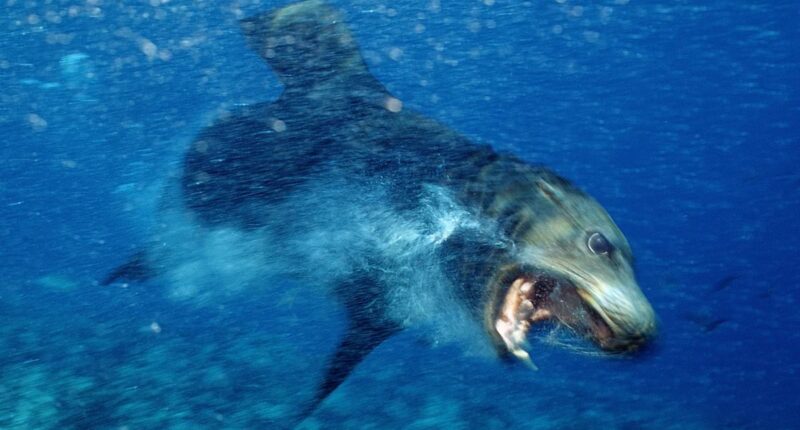The cause behind shocking sea lion attacks in California has finally been discovered.
Researchers in Los Angeles have been investigating a series of incidents where individuals were bitten and scratched by typically amicable marine animals along the Southern California shoreline in recent weeks. These animals were identified as sea lions, which were behaving unusually aggressive and described by victims as ‘demonic’.
The Marine Mammal Care Center has now found that the behavior change was tied to the increasing number of toxic algae blooms forming in the area.
Upon conducting tests on these sea lions, experts discovered that they were afflicted with domoic acid toxicosis, a neurological disorder brought on by exposure to toxic algae. The harmful algae contaminates local fish such as anchovies and sardines as they traverse these blooms in the ocean.
The CEO of the Marine Mammal Care Center, John Warner, provided insights into how the domoic acid accumulation in fish is linked to the atypical behavior exhibited by sea lions, shedding light on the concerning situation unfolding off the coast of Southern California.
These fish are then eaten by the sea lions, contaminating their bodies with the toxin and eventually causing seizures and confusion.
Sadly, as the sea lions get sicker and sicker, the damage to their brains causes them to lash out in terror of anything near them – including people.
‘These animals are reacting to the fact that they are sick,’ Warner told the BBC. ‘They’re disoriented, and most likely, most of them are having seizures, and so their senses are not all fully functional as they normally would and they’re acting out of fear.’

Sea lions are not typically aggressive towards humans, but scientists say the individual was infected with the terrifying neurotoxin (Stock)

Domoic acid toxicosis causes sea lions to become lethargic, erratic, aggressive, and suffer from seizures. The condition can be fatal without treatment
According to the National Oceanic and Atmospheric Administration (NOAA), this is the fourth straight year toxic algae blooms have been developing in Southern California.
NOAA explained that strong winds blow across the ocean off California, pushing surface water aside and pulling up colder, deeper water in a process called upwelling.
This deep water is packed with nutrients like nitrogen that make algae grow fast in the sunlight.
Usually, that’s great for sea life, but sometimes certain algae go overboard, creating huge blooms and pumping out toxins poisonous to fish, shellfish, and even people if they eat them.
Domoic acid toxicosis stems from an organism called Pseudo-nitzschia which can grow into algal blooms in the water.
These harmful blooms of Pseudo-nitzschia produce the domoic acid which infects marine life swimming through it.
Warner added that his nonprofit had already admitted 195 sea lions suffering from domoic acid toxicosis at the end of March.
That’s nearly four times as many than the center treated at the same point in 2024.

Rj LaMendola described the March 21 sea lion attack that injured him as ‘the most harrowing and traumatic experience of my 20 years of surfing,’ adding it ‘left me shaken to my core’
Even worse, the effect of the toxic algae appears to be more severe this year than previous blooms.
‘Their behavior changes from what we’re used to, to something more unpredictable,’ Warner said. ‘But in this particular bloom, we’re seeing them really comatose and rather taken out by this toxin.’
There’s another reason for Southern Californians to worry about sea lions becoming more violent due to this illness – their population has exploded in recent decades.
The California coast is now home to approximately 250,000 sea lions. That’s compared to just 1,500 in the 1920s.


In late March, a teenage girl initially feared she was being attacked by a shark during her lifeguard test in Southern California, but the predator turned out to be another aggressive sea lion

An organism called Pseudo-nitzschia (pictured) can grow into large algal blooms. They produce a neurotoxin called domoic acid, which can accumulate in fish that are eaten by sea lions along the California coast
Photographer Rj LaMendola was one of the most recent sea lion victims. After 20 years of surfing through those waters, the dangerous change in these gentle creatures has left him with PTSD.
‘I’ve spent my life advocating for the ocean through my photography. Right now, I’m terrified…for the ocean and its inhabitants. Something’s wrong,’ told National Geography.
‘The sea lion that attacked me wasn’t just acting out — it was sick, its mind warped by this poison coursing through its system,’ LaMendola added in a Facebook post.
‘Knowing that doesn’t erase the terror, but it adds a layer of sadness to the fear,’ he continued.
In late March, a 15-year-old girl taking a swim test to become a lifeguard was also attacked by an neurologically impaired sea lion.
Other lifeguards came to her rescue and pulled her out of the water before rushing the lifeguard trainee to a local hospital.
Unfortunately, the only way to save these animals is to find the ones poisoned by the algae and treat them quickly.
According to Warner, wildlife experts can save a sea lion suffering from domoic acid toxicosis using anti-seizure medications and sedation.
If vets reach the mammals in time, twice-daily tube feedings and constant hydration can cure the neurological effects within a week. However, the chances of a full recovery are only 50 to 65 percent.
Moreover, treatments this year have not been as effective. Even after five weeks at the Marine Mammal Care Center, Warner noted that some sea lions were still showing signs of lethargy.

















